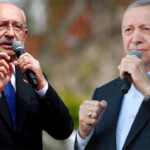If in the course of three years—despite COVID restrictions—more than a quarter of a million of young people in the work force have left the country, and it is likely that this number will rise, with the gloom that Erdoğan’s victory casts over Turkey’s developed urban sphere.
The latest news from Turkey is quite telling of the trend we can expect to see over time. The Turkish Doctors’ Union (TTB) issued a statement that between May 14 and 28, namely between the first and second rounds of the elections, 144 doctors applied for procedures indicating their decision to leave the country.
This is a cyrstallizing pattern. According to Nergis Erdoğan, chairwoman of the TTB, 2,685 total doctors applied last year, and this year so far the number is at 1,119.
During Erdoğan’s rule, working conditions for health staff hardened toward “the extreme,” and so did patterns of violence against doctors in general. To be a doctor in remote provinces includes high risks. According to Erdoğan, “To beat doctors has become something to brag about among the local communities.”
According to Dr Ali Ihsan Okten, vice chairman of Turkish Doctors’ Union (TTB), every day, 7 doctors leave Turkey.
“Why should I stay?” This phrase has become common amongst the youth as well. According to a new study by the Germany-based Konrad Adenauer Foundation, 73% of youths want to emigrate. Further data shows that between 2019 and 2021, around 286 thousand people between 20-29 years of age left Turkey to live elsewhere.
Ayça, a 23 year old woman, told Artı Gerçek news site that she had graduated from university a year ago, but had no chance finding a job despite her attempts.
“The post-election period actually held hope for me,” she said, “But I realized that this hope was taken away and that this system will continue for five more years. The more I thought that my wear and tear in one year would continue for five more years, the more I wanted to leave. When I think about it emotionally, it is very sad to have to leave. But when I leave, I have more faith that I can hold on to something.”
Nermin, a 26 year old graduate, has a similar story. “I open my eyes and realize that I cannot exist in this country with the salary I receive. Besides, the people I work with are not meritorious at all. They are fed by the system, and are placed where the system sees fit. I have to work on behalf of these people who have no qualifications and are disconnected from the rest of the world. In this way, no matter how much I work to improve myself, I will only be able to exist in the system where space allows. Therefore, I don’t want to stay here and spend my energy without getting anything in return,” she said.
In the course of three years—despite COVID restrictions—more than a quarter of a million of young people in the work force have left the country, and it is likely that this number will rise with the gloom that Erdoğan’s victory has cast over Turkey’s developed urban sphere of Turkey.
It is now more or less clear that the strongman, who has made life hell for those who disagree with him or who oppose him from their political and cultural vantage points, will continue to rule Turkey indefinitely. The growing unease is a symptom of people’s perception that he is here to stay, for a lifetime.
For those who are undecided about leaving or staying, it is a tough dilemma. Some want to remain hopeful. Despite an immense push to turn Turkey into a Sunni-dominated bastion of Islamism, Erdoğan has not been successful in breaking the backbone of two important social segments: the western-oriented, secular, mainly urban electorate; as well as the Kurds and Alevis.
The migration trend is not new—it has spanned the last decade. The period between the 2013 Gezi Park protests and Turkey’s recent elections elections has seen an exodus of dissidents and the elite. Some estimate that more than 1.5 million journalists, academics, dissidents from across the spectrum, and others with high job qualifications have left or fled Turkey in what is known as the “dark decade.”
According to Prof Ufuk Akcigit, a Turkish scholar at the University of Chicago, around 12 thousand academics have left Turkey. Akcigit, who did a broad survey with support from the Turkish Informatics Foundation (TBV), talks about a “brain drain paradox”: He argues that those who have moved abroad are the “creme de la creme” of academia, and the more productive they are, the less they want to return to the homeland.
“Only the mediocre want to return” he argues, and points out that Turkey ranks lowest in terms of research and patents among the OECD countries.
The most dramatic brain drain is affecting young IT workers. Thousands of expert staff of private IT startups and companies are now concentrated in Dublin, the UK, the USA and the Netherland—many of them there to stay, given the economic crisis.
Will the emigres return, if the regime changes? The trend is “no”. Demre Delipınar, a nurse who moved to BRD, is a clear example of this attitude.
“I love my country, but I do not plan to return, as I am very happy with my working conditions here. In the future I would like to return and work in my country again if there are developments, not only at work but in all areas of life. I want to live in a country where I feel safe and free, not only as a doctor but also as a woman,” she told Dunya daily.
Dr Uğur Ucyıldız, who lives in England, agrees. He wants to see fundamental changes in Turkey, before considering a return. “I have never seen such a beautiful country. But, if you are not its citizen, Turkey is a paradise!”
Return or not? Life abroad among political refugees—many of them journalists—is not as easy as that of doctors or IT folks. Before the elections I saw a willingness and some preparation among some of my colleagues and scholars to return, although not much thought seems to have been given about what sort of Turkey they would be returning to. Following Erdoğan’s victory, further instability is on the horizon. An economic tsunami is shaping up, signaling that an extremely tough crisis awaits them from the summer on.
With such intellectual drought, mixed with a lack of professional know-how, we are now sure to end up with a country that is, at best, writhing in the hands of mediocrity. If this is the case, the flight of qualified elites from Turkey may continue at an even greater rate. Iran stands as a grim but realistic example. And the realization that the elections were an irreversible development is slowly creeping in amongst the country’s well-educated, modern elite.


